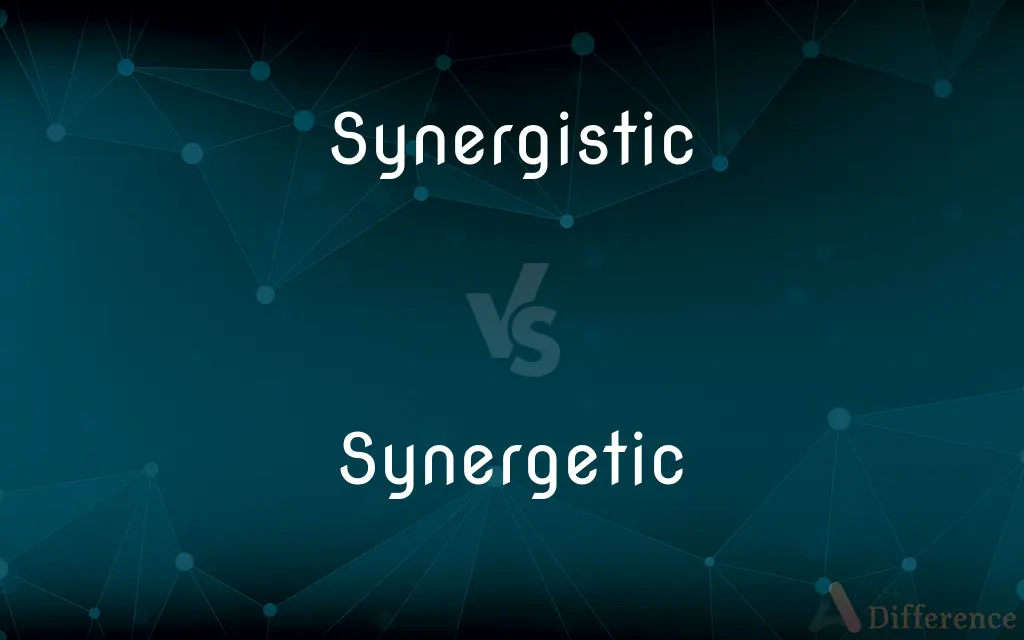Synergistic vs. Synergetic — What's the Difference?
By Maham Liaqat & Urooj Arif — Updated on April 4, 2024
Synergistic and synergetic both describe the interaction of elements that produce a greater effect together than the sum of their individual effects, but "synergistic" is more commonly used in scientific and medical contexts.

Difference Between Synergistic and Synergetic
Table of Contents
ADVERTISEMENT
Key Differences
Synergistic, a term frequently encountered in biology, medicine, and pharmacology, refers to the combined effect of substances or organisms that results in a greater impact than the sum of their separate effects. This concept is often applied to drug interactions where two drugs together provide a more potent effect. Synergetic, while essentially synonymous and sharing the same root in synergy, is less commonly used but often found in discussions about teamwork, organizational behavior, and sometimes in physics to describe systems where components work together in a mutually enhancing manner.
In the context of pharmacology, a synergistic effect might be observed when two drugs, such as aspirin and clopidogrel, are used together to prevent blood clots more effectively than either drug alone. Meanwhile, the term synergetic could be used in business or psychology to describe the enhanced productivity and creativity of a team that works well together, leveraging the diverse skills and perspectives of its members.
The choice between synergistic and synergetic often depends on the field of study or context. For instance, research papers on drug interactions or the combined effects of nutrients on health are more likely to use "synergistic" to describe their findings. On the other hand, "synergetic" might be chosen for its slightly broader implications, suggesting not just a combined effect but a mutually beneficial and enhancing interaction, making it a favorite in more abstract or philosophical discussions.
Despite these subtle differences in usage and preference, the underlying principle of both terms is the idea that the whole is greater than the sum of its parts. Whether discussing the interaction of chemicals, the cooperation between individuals in a team, or the components of a complex system, both synergistic and synergetic underscore the enhanced outcomes achieved through cooperation and combination.
The interchangeable use of synergistic and synergetic is generally acceptable, though awareness of the audience and the conventional usage within specific fields can guide the appropriate choice. In scientific literature, the precision of terminology is crucial, hence the preference for "synergistic" to describe specific interactions with quantifiable outcomes. In contrast, "synergetic" may be more aligned with discussions that encompass both tangible and intangible elements of cooperation and enhancement.
ADVERTISEMENT
Comparison Chart
Primary Context
Scientific, medical, pharmacological
Organizational, psychological, abstract
Usage
More commonly used
Less commonly used, more abstract
Implication
Emphasizes quantifiable, enhanced outcomes
Suggests mutually beneficial enhancement
Examples
Drug interactions, biological synergy
Teamwork dynamics, organizational behavior
Field Preference
Preferred in fields requiring precise terminology
Chosen for broader discussions of cooperation
Compare with Definitions
Synergistic
Involving interaction that leads to enhanced effects.
The synergistic effect of combining these two antibiotics can combat resistant bacterial strains more effectively.
Synergetic
Pertaining to systems or processes that are mutually enhancing.
The team's synergetic effort led to an innovative solution.
Synergistic
Used to describe the combined action resulting in a greater effect.
Researchers are exploring the synergistic potential of these compounds in cancer treatment.
Synergetic
Can be used in various contexts, including organizational behavior.
Synergetic leadership strategies often result in high team morale.
Synergistic
Pertains to the scientific measurement of combined effects.
This study shows a synergistic interaction between the two enzymes.
Synergetic
Suggests both tangible and intangible benefits.
The synergetic effects of the community project were felt throughout the neighborhood.
Synergistic
Often found in medical and biological contexts.
A synergistic approach to therapy may yield better patient outcomes.
Synergetic
Used more abstractly to describe cooperative interactions.
A synergetic relationship between the departments has improved overall performance.
Synergistic
Indicates a quantitative enhancement.
The synergistic effects were evident in the improved health of the patients.
Synergetic
Implies a broader, more holistic cooperation.
Their synergetic vision for the company has sparked significant growth.
Synergistic
Of or relating to synergy
A synergistic effect.
Synergetic
Synergistic.
Synergistic
Producing or capable of producing synergy
Synergistic drugs.
Synergetic
Relating to synergetics.
Synergistic
(Christianity) Of or relating to synergism.
Synergetic
Relating to synergy; synergistic.
Synergistic
Of or pertaining to synergy or synergism; synergic; co-operative, working together, interacting, mutually stimulating.
Synergetic
Working together; coöperating; as, synergetic muscles.
Synergistic
Of or pertaining to synergism.
Synergetic
Working together; used especially of groups, as subsidiaries of a corporation, cooperating for an enhanced effect;
A synergistic effect
Synergistic
Coöperating; synergetic.
Synergistic
Used especially of drugs or muscles that work together so the total effect is greater than the sum of the two (or more)
Synergistic
Of or relating to the theological doctrine of synergism
Synergistic
Working together; used especially of groups, as subsidiaries of a corporation, cooperating for an enhanced effect;
A synergistic effect
Common Curiosities
Are there contexts where "synergetic" is more appropriate than "synergistic"?
"Synergetic" may be more appropriate in discussions about teamwork, leadership, and organizational behavior where the focus is on the holistic enhancement of performance.
How do I decide which term to use in my writing?
Consider your audience and the context. If you're writing for a scientific or medical audience, "synergistic" is likely more suitable. For discussions that span across disciplines or focus on abstract cooperation, "synergetic" may be preferred.
Which term is more common in medical research?
"Synergistic" is more commonly used in medical research, especially when discussing the combined effects of drugs or treatments.
Are there examples of synergetic effects in technology or engineering?
In technology and engineering, synergetic effects can be seen in interdisciplinary innovations where combining expertise from different fields leads to breakthroughs, such as in the development of smart materials or renewable energy solutions.
Do these terms only apply to positive outcomes?
While typically used to describe beneficial interactions, in a broader sense, they could also apply to situations where the combination of factors leads to an enhanced negative outcome. However, this usage is less common.
What role do synergistic effects play in environmental science?
In environmental science, synergistic effects can be critical in understanding how different pollutants or changes in the environment might combine to impact ecosystems and climate in ways that are more significant than the sum of their individual effects.
Can "synergistic" and "synergetic" be used interchangeably?
Yes, they can be used interchangeably, though "synergistic" is preferred in scientific contexts for its precision.
Is there a difference in origin between "synergistic" and "synergetic"?
Both terms derive from the Greek word "synergos," meaning working together. Their origins are closely related, reflecting the concept of cooperation or combined effort.
Can the concept of synergetic effects be applied to personal development?
Yes, in personal development, combining various practices like exercise, healthy eating, and mindfulness can have a synergetic effect on overall well-being and productivity.
How do educators use the concept of synergistic learning?
Educators might apply synergistic learning by integrating different subjects or pedagogical approaches, enhancing learning outcomes by creating connections between diverse areas of knowledge.
How does the concept of synergy relate to social movements?
In social movements, synergy refers to the enhanced impact achieved when individuals or organizations collaborate, combining resources, knowledge, and efforts to advocate for change more effectively than they could independently.
Can "synergistic" effects occur in nature, outside of human intervention?
Yes, synergistic effects are often observed in nature, such as in ecosystems where different species interact in ways that benefit their survival and thriving.
Are there risks associated with synergistic interactions in pharmacology?
Yes, while synergistic interactions can enhance therapeutic effects, they can also increase the risk of side effects or toxicity, making it important to carefully manage and monitor drug combinations.
Is there a mathematical model to predict synergistic outcomes?
While specific models can predict outcomes based on known interactions, the complex nature of synergistic effects often makes precise prediction challenging. Models typically require extensive data on the components' interactions.
How can understanding synergistic and synergetic principles benefit businesses?
Businesses can leverage these principles to enhance teamwork, innovate through cross-disciplinary collaboration, and create products or services that offer superior value by combining different components or technologies.
Can synergy be negative?
Though synergy is often discussed in positive terms, negative synergy, where combined effects lead to worse outcomes than expected, can occur, particularly in cases of incompatible goals or counterproductive interactions.
Are there tools or methodologies to enhance synergistic collaboration in teams?
Various tools and methodologies, such as collaborative software, brainstorming techniques, and project management frameworks, are designed to enhance synergistic collaboration by improving coordination and leveraging diverse skills and perspectives.
How important is communication in achieving synergistic or synergetic outcomes?
Communication is crucial; clear, open communication facilitates the understanding and alignment necessary for the effective collaboration that underpins synergistic or synergetic outcomes.
In psychology, how are synergistic or synergetic concepts applied?
In psychology, these concepts may be applied to understand group dynamics, where the collective effort and interaction of group members lead to enhanced problem-solving abilities or creativity compared to individuals working alone.
How do synergistic and synergetic concepts influence innovation?
These concepts encourage cross-functional teams and interdisciplinary research, driving innovation by combining insights and techniques from different fields to create novel solutions.
Share Your Discovery

Previous Comparison
Innovative vs. Novel
Next Comparison
Parmigiana vs. SchnitzelAuthor Spotlight
Written by
Maham LiaqatCo-written by
Urooj ArifUrooj is a skilled content writer at Ask Difference, known for her exceptional ability to simplify complex topics into engaging and informative content. With a passion for research and a flair for clear, concise writing, she consistently delivers articles that resonate with our diverse audience.
















































